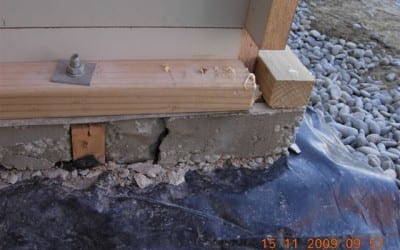New Building Act rules that came into force on the 1st of January 2015 require builders, among other things, to declare to customers the insurance and guarantees they have, including limits and “relevant exclusions”. As it stands, it’ll be up to individual builders to decide which exclusions are relevant. But should you be expected to know this, and what if you get it wrong? We take the time here to explain some of the most common insurance and guarantee options for builders and highlight some of the common exclusions.
| THIRD PARTY WORKMANSHIP GUARANTEES | COMMON EXCLUSIONS |
| Giving peace of mind to owners that if their builder fails to meet their obligations (generally due to insolvency), an independent party will step in to do so. These guarantees generally cover four main areas: | |
| LOSS OF DEPOSIT – refunds the customer’s deposit if work has not commenced. | Contractual disputes, failure of products to meet the manufacturer’s specifications, consequential loss, defects within acceptable tolerances, and aesthetic variances |
| EXTRA COMPLETION COSTS – organises and pays the additional costs to complete a project when the builder is unable to do so. | |
| NON-STRUCTURAL DEFECTS – covers defects in the construction due to poor workmanship, for a period of two years from completion. | |
| STRUCTURAL DEFECTS – covers serious defects that could lead to water ingress or other structural failure, for a period of 10 years. | |
It should be noted that these guarantees are purely to protect the customer. They provide no benefit to the builder, other than differentiating you from builders who can’t offer them.
| PHYSICAL ASSETS/PROPERTY INSURANCE | COMMON EXCLUSIONS |
| Insuring property from damage or loss. | |
| CONSTRUCTION (CONTRACT WORKS) INSURANCE – protecting the project from hazards such as theft, accidental damage, storm, fire and natural disaster.
Every job should have contract works insurance in place; most contracts will require it, and if it’s a new build, the builder is generally responsible for arranging it. It should name the builder, owner and subcontractors, so all parties are covered.
If the job is a renovation, alteration or addition, it is usually the owner, not the builder, who should arrange contract works insurance through their existing house insurer. Again, it should cover all the parties involved in the build. |
Damage to existing structures, consequential loss, contractor’s tools and equipment, partial occupation, workmanship & design |
| COMMERCIAL MOTOR VEHICLE – comprehensive cover includes accidental physical loss or damage to your vehicle, as well as your liability for damage or injury to other people and their property caused by the vehicle. Cover can also be limited to third-party liability only or include third-party liability, fire & theft. | Liability for property being carried on or in the vehicle, damage caused by the vibration or weight of the vehicle |
| TOOLS, PLANT & EQUIPMENT – covers loss or damage, including tools and equipment you’ve hired. Policies are generally for market value only, but specialist insurers can give replacement value cover. | Damage from natural hazard (this can be added back as an option). Theft from unlocked vehicles |
| MATERIAL DAMAGE – protects your buildings, as well as stock, plant and machinery located at a specific site such as a workshop. | Building defects, defective design, materials & workmanship |
| LIABILITY INSURANCE | COMMON EXCLUSIONS |
| Insuring your liability for injury, damage or loss suffered by another party. Usually includes cover for legal costs also. | |
| PUBLIC (GENERAL/BROADFORM) LIABILITY – covers your liability for accidentally damaging another person’s property (and in some cases, injury).
Every builder should have public liability insurance in place. Customers will want to know that if their builder (or one of their subbies) causes some major damage, there is an insurance company with deep pockets available to pay for the loss. |
Faulty workmanship & materials, damage to the property you’re working on, your own products and damage arising from your professional advice (specialist insurers such as Builtin can add some of these back in to your cover) |
| ERRORS & OMISSIONS / PROFESSIONAL INDEMNITY – protection if you’re held liable by someone for a financial loss they have suffered. E.g.. use of the wrong materials or failure to correctly follow a design or specification. Includes cover for legal costs and damages awarded by the court.
It has been difficult for trade professionals to get indemnity cover that suits their occupation in the past, but this is now available from specialist insurers like Builtin. |
Property damage & injury, financial estimates, building surveys and inspections, faulty materials and workmanship, financial failure |
| STATUTORY LIABILITY INSURANCE – cover for legal costs and fines levied under legislation such as the Building Act, Resource Management Act & Fair Trading Act. Fines for breaching health & safety law can’t be insured, but the policy will cover the legal costs and reparation payments if you are taken to court for breaching health & safety law. | Deliberate disregard for legal obligations |
| EMPLOYERS LIABILITY – provides cover for your liability for injury to employees that is not covered by ACC. | Failure to take reasonable precautions to prevent injury |
| EARNING CAPACITY INSURANCE | COMMON EXCLUSIONS |
| Insuring your ability to earn an income and provide for yourself and your family. | |
| LIFE pays a lump sum in the event of your death.
|
|
| PERMANENT DISABILITY – pays a lump sum in the event of permanent disability. This can be linked to your ability to return to your previous occupation, or to work in any job. | Self-inflicted injury, failure to follow treatment advice |
| TRAUMA – pays a lump sum in the event of certain illnesses that require medical attention and/or surgery. | Self-inflicted injury, failure to follow treatment advice |
| INCOME PROTECTION – pays a selected percentage of lost income if you become disabled or unable to work due to illness or injury. Beneficial in circumstances where ACC payments are limited or not payable. | Self-inflicted injury, failure to follow treatment advice |
| FINANCIAL EXPOSURE INSURANCE | COMMON EXCLUSIONS |
| Insuring your business from the cost of bad debt and lost income. | |
| TRADE CREDIT/PAYMENT GUARANTEE COVER – pays a proportion of the money owed to you following the insolvency of a debtor. | Retentions |
| PERFORMANCE/RETENTION BONDS – guarantee the performance of their contract by contractors. Offered in lieu of cash retentions and to ensure the fulfilment of a contract. More common in commercial and large residential projects. | |
| BUSINESS INTERRUPTION – covers your lost profit or increased costs if your business is affected by an event that can be claimed under a material damage policy. | Loss from mechanical or electrical breakdown |
The best way to assess your specific insurance needs is to conduct a risk assessment of your situation. An insurance professional (preferably one with experience in the construction sector) is a good place to start.
This article is not exhaustive, and there are other policies to cover different risks. In addition, individual policy wordings from different insurers may vary. You should refer to the specific exclusions in your own policy wordings and discuss your situation with an insurance professional if you are unsure.




